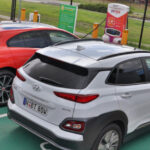

EV Testing: Ensuring Performance, Safety, and Reliability.
As electric vehicles (EVs) continue to gain traction globally, the importance of rigorous EV testing has become more evident than ever. EV testing is a critical step in ensuring that these vehicles deliver top-notch performance, meet safety standards, and provide the reliability that consumers expect. Here’s a deep dive into why EV testing matters and how it shapes the future of sustainable transportation.
The Need for EV Testing
Electric vehicles represent a significant departure from traditional internal combustion engine (ICE) cars. With advancements in battery technology, motor efficiency, and software integration, EVs require a completely different testing approach. EV testing ensures that each component, from the battery pack to the regenerative braking system, functions seamlessly under various conditions. This process not only guarantees consumer satisfaction but also instills confidence in a market that is still transitioning from fossil fuels to cleaner alternatives.
Key Areas of EV Testing
- Battery Performance and Safety
The battery is the heart of any EV. Comprehensive tests are conducted to evaluate the battery’s range, charging efficiency, and lifecycle. Safety tests, such as thermal runaway simulations, ensure that the battery can withstand extreme conditions without posing risks to occupants. Manufacturers also test for charging compatibility with different types of chargers, ensuring convenience for users. - Motor and Drivetrain Efficiency
EV motors are designed to provide instant torque and efficient energy conversion. Testing focuses on the motor’s durability, power output, and ability to perform under varying loads. This ensures smooth acceleration, deceleration, and overall vehicle responsiveness. - Software and Connectivity
Modern EVs are as much about software as they are about hardware. Features like autonomous driving, over-the-air updates, and energy management systems are rigorously tested to ensure seamless integration. Cybersecurity tests are also conducted to protect vehicles from potential hacking threats. - Crash and Safety Standards
EVs undergo stringent crash tests to ensure they meet global safety regulations. These tests evaluate the structural integrity of the vehicle, battery safety during collisions, and the effectiveness of features like airbags and advanced driver-assistance systems (ADAS). - Environmental Testing
EVs are tested in extreme weather conditions to ensure optimal performance in diverse climates. Cold weather tests evaluate battery performance and charging times, while hot weather tests assess cooling systems and thermal management.
The Role of Testing Facilities
Specialized EV testing facilities play a crucial role in pushing the boundaries of electric vehicle technology. Equipped with cutting-edge tools, these facilities simulate real-world driving scenarios, allowing manufacturers to identify and address potential issues before mass production. With dedicated tracks, wind tunnels, and climatic chambers, these centers provide a controlled environment for comprehensive testing.
Why It Matters to Consumers
For consumers, EV testing translates to confidence in their vehicle’s performance and safety. Knowing that an EV has undergone rigorous tests reassures buyers that they are investing in a product that meets the highest standards. Additionally, thorough testing helps manufacturers maintain their reputation and comply with regulatory requirements.
Conclusion
EV testing is more than just a step in the manufacturing process; it is a commitment to delivering vehicles that are safe, reliable, and efficient. As the EV market continues to evolve, advancements in testing will play a pivotal role in driving innovation and ensuring consumer trust. Whether you’re considering your first EV or looking to upgrade, understanding the importance of EV testing can help you make an informed decision and embrace the future of transportation with confidence.
Add a comment Cancel reply
Comments (1)
How to Inspect a Used EV Before Buying - BCEVS
[…] As electric vehicles (EVs) continue to gain popularity, many prospective buyers are considering purchasing used models as a more affordable and sustainable option. However, buying a used EV requires a careful inspection to ensure you’re getting a reliable vehicle. Here’s a handy guide to help you understand How to Inspect a Used EV Before Buying […]
Categories
- Car News (10)
- Car Reviews (7)
- Educational Tips (7)
- Electric Cars (9)
- EV Battery (1)
- EV Charging (8)
- EV Testing (3)
- Uncategorized (28)
Recent Posts
Related posts










